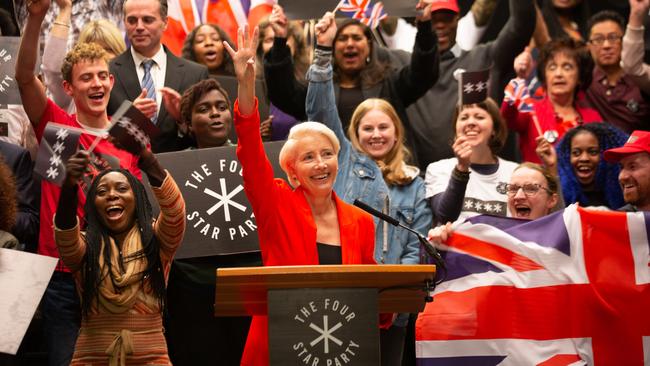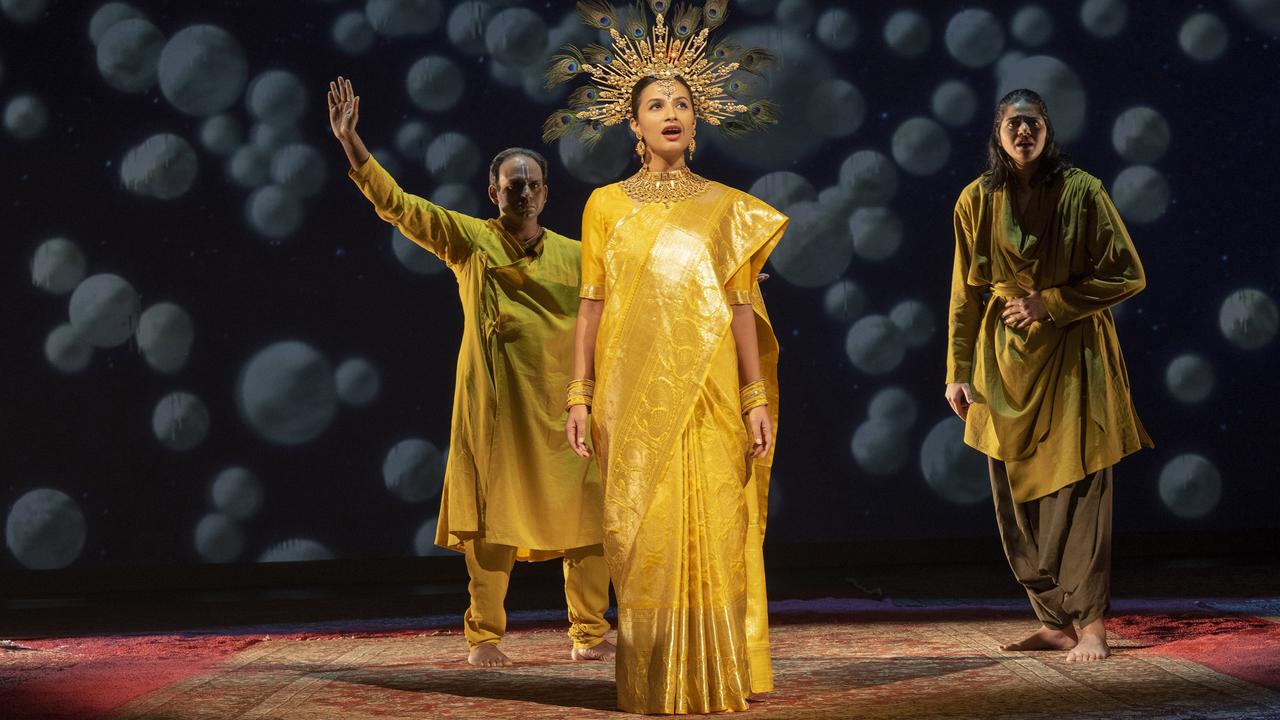Dystopian Years and Years
The most talked about show of the year, which charts the terrifyingly unremarkable rise of a populist dictator in Britain, is the dystopian story for our times.

Years and Years is from Russell T. Davies, the Queer as Folk creator and the producer who reimagined Doctor Who so successfully, and it’s fast becoming the most talked about show of the year, along with the second season of Succession. And, inspired by both the election of Donald Trump and the Brexit vote, there’s a neat conceit at its centre.
It tells the story of the rise of a populist dictator, Viv Rook, played by Emma Thompson, but does it not by concentrating events on her terrifying rise to power — the political mechanics of her ascension — but rather on the ordinary people affected. And through their interactions slowly it reveals a measured, plausible, almost unremarkable transition to tyranny.
“It’s been boiling away in my mind for a long time, but over the past few years the world itself seems to have been boiling faster and hotter and wilder than ever,” Davies says on the BBC’s media site. “I mean, the age, today, just seems fevered – we’re either more political, or more scornful of politics, than ever. And I think, in the past, politics meant the economy to most people, but now we’re seeing that it’s our identity at stake.”
Beginning in 2019, with Trump still building his walls and British parliament not having worked out the troublesome Irish backstop, we encounter the extended Lyons family in Manchester one night, a diverse lot in race, sexual preference, gender identity and physical disability, presided over by Gran, played with sardonic edge by Anne Reid. Her grandchildren are Stephen, Daniel and Rosie (Rory Kinnear, Russell Tovey and Ruth Madeley). And then there’s Jessica Hynes’s Edith, an activist somewhere overseas again saving the planet. There’s also a host of husbands, wives, sisters, sons and daughters, and Rosie’s half-Chinese baby, Lincoln.
They’re worried about the world they live in – the banks, politics, corporations and America with its fake news and false facts.
Tovey’s Daniel sums it up early on, young Lincoln in his arms. “Don’t know if I could, have a kid in a world like this,” he says. “If it’s this bad now, what’s it going to be like for you in 30, 10, five years?”
Then, beautifully on cue, Davies always a whiz with timing, the family drama is propelled forward in time, year by year, in a series of surprising and witty montages. Trump is re-elected, Angela Merkel dies (“Good riddance,” remarks the omnipresent Rook, hardly off the TV as the years roll on so rapidly. “The world just got a whole lot prettier.”) And by 2024 life has become more unbearable. London is overrun by refugees from the Ukraine, some areas requiring means-testing for entry, the border deal with Ireland has still not been settled and unrest is everywhere.
All this happens around the tight-knit Lyons family, an extended bunch who somehow manage to talk with each other constantly, always in and out of each other’s lives, as they navigate extremist politics, climate change and even more technological encroachments on life. Stephen and wife Celeste have a major problem with daughter Bethany, who is in “transition”: she wants to be transhuman or fully digital, her brain downloaded into the cloud so she can live forever as data.
And Viv Rook’s populism is on the rise as she forms her own political movement to represent the people abandoned by the big, old parties. She calls it The Four Star Party, after the **** used by newspapers to convey the f-word she utters on TV the first time we see her. (Asked a question about Israel and Palestine on some talk show, she says, “I don’t give a f..k, all I want is for my bins to be collected every week”.) Davies cleverly positions Rook’s development so that while central to the story she remains peripheral to the action, her face and voice constantly coming at us from ubiquitous TV screens.
Yes, this is bleak drama, so cleverly juxtaposing social realism, a kind of sci-fi dystopianism and a caustically satirical look at populist politics but it’s surprisingly funny in places, with Davies admitting he can’t write more than six lines without putting in a gag, witty and clever. And there’s a romance, too, between Daniel, who’s discovered his recent marriage to his boyfriend is all he wished for, and asylum-seeker Victor, a young Ukrainian who fled Kiev after being tortured by the Russian-allied authorities for being gay. But it’s the life force of this wonderfully close family that sticks in the mind after you watch and the way that through them we gain such insights into politics and society.
Be prepared – Davies, always the magician, pulls a ferocious surprise out of his writer’s hat just before the first episode ends, horrifically changing the nature of reality for the Lyons family just as they enjoy the annual outdoor birthday bash for grandmother Muriel.
The new TV version of the classic HG Wells story, The War of the Worlds, first published in serial format in Pearson’s Magazine in 1897, is certainly different to anything we’ve seen before. Wells’s story is a template for many such alien invasion stories to come. This time it’s adapted by Peter Harness, best known for his writing on Doctor Who and directed by the experienced British director Craig Viveiros, who gave us the BBC’s classy 2015 adaptation of Agatha Christie’s And Then There Were None, and serial-killer drama Rillington Place.
At a time when the British exported war to distant shores in all their pompous greatness, Wells launched his alien forces into the cosy surroundings of southern England itself, infuriated by the wanton extermination of indigenous races in imperial wars.
“We must remember what ruthless and utter destruction our own species has wrought, not only upon animals, such as vanished bison and the dodo, but upon its own inferior races,” his narrator says in the novel, citing the way “the Tasmanians were entirely swept out of existence in a war of extermination waged by European immigrants, in the space of 50 years”.
And through many relocations and successive reworkings, including not only the famous realistic radio adaptation of Orson Welles that caused a nationwide panic in the US, but films, TV series and even popular music albums, Wells’s work has encapsulated the paranoia of successive ages. Whether the fear of the Nazis in the late 1930s, the Cold War in the 1950s or Steven Spielberg’s hardly subtle paralleling of the 9/11 terrorist attack.
And this new version seems to stem from the Brexiteers’ dystopian fantasy of domination from the continent – almost as if defeated in a war – that has become indistinguishable from reality, haunting the imagination of British conservatism; unfortunately, it’s hard to know from the first episode, a rather infuriating and meandering affair.
Almost all adaptations of Wells’s story, including the Spielberg movie, have been set in the modern time in which the project was produced. But Harkness sets his reimagining in the Victorian setting of the source material, re-creating the original in a way that has not often been seen.
The minister in London, who is filling in for the absent Prime Minister, on being informed that a strange object has landed from above, insists there’s nothing to be worried about. That is after he’s assured it couldn’t possibly be the Russians who are currently causing a fuss attacking British ships up in the North Sea.
After all, it might just be a shooting star that extinguished itself near the sleepy town of Woking in Surrey, or a small meteorite that has caused a local forest fire. Or just an act of God that has caused some rock to drop from the heavens.
But George and Amy, the two protagonists in Harkness’s version, know better. They are young lovers ostracised from formal society trying to establish a new life for themselves after George, a London journalist, has left his embittered wife and a miserable marriage largely engineered by his well-to-do family, his brother a big wig at the Admiralty. Their friend Ogilvy, an astronomer and scientist who is the first to see some explosive plumes that he telescopically spots on the surface of Mars, also is making a new life. Soon they witness the landing of a giant meteorite containing a cylinder that lands in the rural countryside of Woking, Surrey, where George and Amy have settled.
Before long, heat rays emanate from the cylinder, devastating the crowds that gather, and George and Amy are on the run from a group of massive newly assembled tripodal war machines, looming mechanisms designed to exterminate human beings with remorseless rapidity and efficiency.
Unlike the machines, the series is a creaky, rather wobbly piece of work, the chronology alone a cause for the shaking of heads. Thankfully, though, a cast that includes Eleanor Tomlinson as Amy, Rafe Spall as George, Robert Carlyle as Ogilvie and Rupert Graves as George’s brother, Freddie, battles as courageously as the characters as they attempt to survive the invasion with some credibility intact.
Years and Years, Wednesday, SBS, 8.30pm.
War of the Worlds, Thursday, Fox One, 7.30pm.



